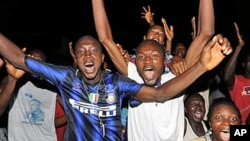According to Guinea's Supreme Court, Alpha Conde captured more than 52 percent of the votes to win the nation's presidential election.
Guinea Supreme Court President Mamadou Sylla announced the final results.
Sylla says candidate Alpha Conde won 1,474,973 votes, or 52.2 percent.
The second round of presidential elections was held in early November, pitting Mr. Conde against former Prime Minister Cellou Dalein Diallo. After initial results showed Mr. Conde the winner, Mr. Diallo petitioned the Supreme Court to reject results from two northern regions where he says anti-Peul riots weeks earlier caused his supporters to flee the area, and they were unable to cast their votes for Mr. Diallo.
Mr. Diallo is of Peul ethnicity and this election brought tensions between his supporters and Mr. Conde's Malinke supporters.
But Thursday evening the Supreme Court said there was not sufficient proof that Mr. Diallo's supporters were intimated from the polls. They also threw out a similar complaint by Mr. Conde in the Labe region.
The vote is considered the first free democratic election since Guinea's independence from France in 1958. Alexandra Lambsdorff, head of the European Union electoral observation mission in Guinea, said international observers, as well as monitors from the Diallo and Conde parties, were granted access to the polls. He said the voting process was transparent.
"The second round of the presidential elections in Guinea has been conducted in a way that was technically credible, with a degree of transparency that actually set an example or the entire region," he said.
The international rights advocacy group Human Rights Watch says that despite the evident transparency of the voting process, security forces in Guinea used excessive force after the second round of elections.
According to an HRW report, at least 84 victims suffered from gunshot wounds in the days after the elections. Most of the violence by the armed forces, a majority of whom are Malinke, was aimed at Mr. Diallo's Peul supporters.
The report also described other ethnic-based violence where Peul youth attacked Malinke and Soussou men. HRW's report urged the new president to reform the security forces and work to ease ethnic tensions.












